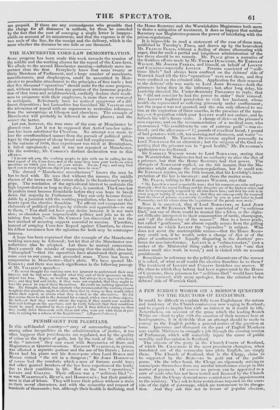THE MANCHESTER CORN-LAW DEMONSTRATION.
SOME progress has been made this week towards the reunion of
the middle and the working classes for the repeal of the Corn-laws. We allude to the second Manchester meeting—infinitely more im- portant than the first. Everybody knew that some twenty or thirty Members of Parliament, and a large number of merchants, manufacturers, and shopkeepers, could be assembled in Man- chester to proclaim attachment to the principles of free trade ; but that five thousand "operatives" should unite for the same purpose, and, without interruption from any portion of the immense popula- that five thousand "operatives" should unite for the same purpose, and, without interruption from any portion of the immense popula- tion of that town and neighbourhood, cordially declare their readi- ness to cooperate with their employers, is more than we ventured to anticipate. Reluctantly have we noticed symptoms of a dif- ferent disposition; but Lancashire has furnished Mr. VILLIERS and the advocates of repeal with an argument to neutralize inferences from the miscarriage at Glasgow and elsewhere. The example of Manchester will probably be followed in other places; and the sooner the better.
Let not, however, the true state of the case at Manchester be glossed over. Let it not be supposed that Anti-Corn-law agita- tion has been substituted for Chartism. No attempt was made to lore the unenfranchised masses front the pursuit of political privi- leges by the prospect of cheap bread and full employment. When, in the autumn of 1 838, that experiment was tried at Birmingham, it failed egregiously ; and it was not repeated at Manchester. On the contrary, Mr. COBDEN'S distinct declaration was to this effitct-
" I do not ask you, the working people, to join with me in calling for the total repeal of the Corn-laws, and at the same time turn your backs on other questions on which you have set your minds. Co on, 1 say; and may God speed you in every righteous object you may have in view."
The shrewd " Manchester manufacturer" knows the men he has to deal with. He sees that without the masses, the middle classes of the towns are like rotten sticks in the landowner's sturdy gripe. The resolution of the agricultural interest to maintain the high import-duties as long as they dare, is manifest. The Corn-law Repealers must become formidable betbre they can hope to break down the. majority in Parliament. They can only become formi- dable by a junction with the working population, who have set their hearts upon the elective franchise. To affront and exasperate the claimants of political privileges by ridicule and opposition—to say to them, " You shall not have your desire because it is not ours also; so abandon your impracticable politics and join us in ob- taining free trade,"—this Mr. COBDEN has discovered is not the best method of securing support essential to success. Therefore, instead of arraying Corn-law Repeal against Chartism, lie shows his know townsmen how the agitation for both may- be contempo- raneous.
A hope has been expressed that the example of the Manchester working men may be followed; but let that of the Manchester ma- nufacturer also be adopted. Let there be mutual concession. Don't commit the mistake of supposing that the middle class has " triuniphed"—that the operatives have abandoned their ground, come over to our camp, and grounded arms. There has been a compromise in Manchester—that's plain. We have quoted Mr. COBDEN ; and there was much significance in the following passage of Mr. VILLIERS'S speech-
" Ile never thought the working men ton ignorant to understand their own interest, and he had never thought what they said of their ignorance on this subject was true. They, as working men, had always been opposed to these laws; and they had said lately, if they were not repealed, that they ought to love the power to repeal theta themselves. He could see nothing ignorant in this. He thought, indeed, that anybody who recommended the working classes to agitate this question, ought to show them that by doing so they would either obtain their repeal, or obtain what they &sired as the alternative, lie did then advise them to aid in the demand far u repeal. with a view to those objects. Ile believed that they would obtain the repeal, if they would now manifest their real aelings on the question ; and he verily believed that their condition
would be much benefited by their repeal ; but if they tidied in doing so, then they would ;Mist thousands with them and who, were not with them at pre- sent, in calling for a reform of the Legislature." (Repotted cheers.)


























 Previous page
Previous page